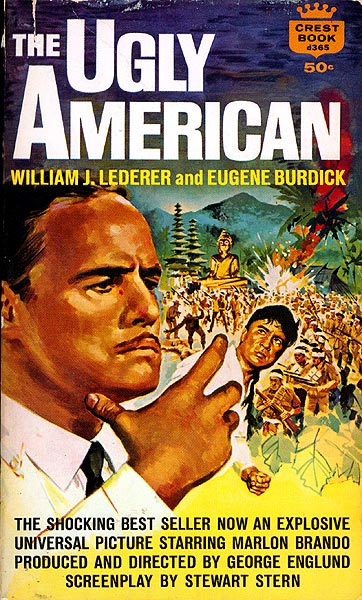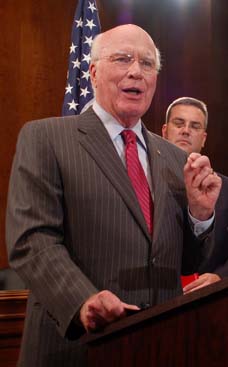
A half century after "The Ugly American," the United States has another young president urging us to connect with the wider world, only this time he has lived in it. "I know that the stereotypes of the United States are out there," Barack Obama recently told university students in Istanbul. "And I know that many of them are informed not by direct exchange or dialogue, but by television shows and movies and misinformation." Lederer and Burdick would most likely respond that no matter how cosmopolitan a superpower's leadership, foreign opinion is also informed by its actions, or lack thereof. Obama's 2010 budget proposes increasing the Peace Corps's financing by 10 percent, to $373 million, though that will not come close to covering his proposal to double the number of volunteers to roughly 16,000, close to the 1965 peak. As Mark Gearan, a former Peace Corps director, lamented to The Boston Globe, "We spend more on the military marching bands."
China RPCV Michael Meyer writes: Still ‘Ugly' After All These Years
Still ‘Ugly' After All These Years
By MICHAEL MEYER
Published: July 10, 2009
In the annals of misunderstood titles, a special place belongs to William J. Lederer and Eugene Burdick's novel "The Ugly American." Today, the phrase is shorthand for our compatriots who wear tube tops to the Vatican or shout for Big Macs in Beijing. But as summer vacation season begins (at least for those who can still afford it), it's worth recalling that the impolitic travelers in "The Ugly American" aren't drunken backpackers or seniors sporting black socks, but the so-called educated elite of the diplomatic corps, whose insensitivity to local language and customs prompts observations like this:
"The simple fact is, Mr. Ambassador, that average Americans, in their natural state, if you will excuse the phrase, are the best ambassadors a country can have," a Filipino minister tells an American official. "They are not suspicious, they are eager to share their skills, they are generous. But something happens to most Americans when they go abroad. Many of them are not average . . . they are second-raters."
Published in 1958, the book is often confused with another cold-war-era novel set in Southeast Asia, "The Quiet American," which appeared in 1955. Yet "The Ugly American," which depicted the struggle against insurgent Communism in the fictional nation of Sarkhan, was the bigger success, spending 76 weeks on the best-seller list and selling roughly five million copies. Writing in the Book Review, the veteran correspondent Robert Trumbull called it a "devastating indictment of American policy" and a "source of insight into the actual, day-by-day byplay of present titanic political struggle for Asia."
The novel is a series of linked sketches of real people that Lederer, a Navy captain who served as special assistant to the commander in chief of United States forces in the Pacific and Asian theater, and Burdick, a political scientist, encountered overseas during the buildup to Vietnam. The book was originally commissioned by W. W. Norton as nonfiction, but an editor suggested it might be more effective as a novel. "What we have written is not just an angry dream," the authors note in the introduction, "but rather the rendering of fact into fiction." Yet the book's enduring resonance may say less about its literary merits than about its failure to change American attitudes. Today, as the battle for hearts and minds has shifted to the Middle East, we still can't speak Sarkhanese.
In "The Ugly American," Ambassador "Lucky" Lou Sears stews in his luxurious compound in the capital, fuming over his Soviet counterpart's latest checkmate. "The American ambassador is a jewel," the Soviet diplomat - who is fluent in the local language, customs and religion - cables Moscow. "He keeps his people tied up with meetings, social events, and greeting and briefing the scores of senators, congressmen, generals, admirals, under secretaries of state and defense, and so on, who come pouring through here to ‘look for themselves.' " Sears undermines a Wisconsin dairyman's self-started project to raise nutrition levels in the Sarkhan countryside, thwarts a band of anti-Communist irregulars formed by a militant Massachusetts priest, and orchestrates the dismissal of his more capable successor, who fails to convince Washington of an impending coup.
The Ugly American of the title is not one of these bunglers, but the book's hero, a millionaire engineer named Homer Atkins, whose calloused and grease-blackened hands "always reminded him that he was an ugly man." Homer is the very model of the enlightened ambassador (lowercase) the authors thought America should send into the world. He and his wife become a proto-Peace Corps couple, homesteading in an earthen-floored hut and collaborating with villagers on inventions like a bicycle-powered irrigation pump. Homer's voice sounds surprisingly contemporary, as if he's channeling "Dead Aid," Dambisa Moyo's recent polemic against current global development practices. "Whenever you give a man something for nothing," Homer warns, "the first person he comes to dislike is you."
"Our aim is not to embarrass individuals," the authors declared in their introduction, "but to stimulate thought - and, we hope, action." One person it inspired was John F. Kennedy, who mailed a copy of "The Ugly American" to each of his Senate colleagues. The book's epilogue argues for the creation of "a small force of well-trained, well-chosen, hard-working and dedicated professionals" fluent in the local language - not unlike the Peace Corps, which Kennedy proposed in 1960.
For the earliest volunteers, "The Ugly American" provided a sort of how-not-to-travel guide. "When I was in college in the late '50s, everyone was reading ‘The Organization Man,' and plotting ways to get ahead in corporate life," John Coyne, a co-founder of the unofficial Web site Peace Corps Worldwide, said in an e-mail message. "But some of us were reading ‘The Ugly American' instead."
Coyne left for Ethiopia in 1962. The following year, Paul Theroux arrived as a volunteer in Malawi. " ‘The Ugly American' was well known even by people who hadn't read it," Theroux said via text message while hiking in Portugal. "Because of the book, the Peace Corps was at pains to teach volunteers the host-country language. I was able to speak Chichewa well enough to hold lively conversations the day I arrived."
By the time I was sent to China as a Peace Corps volunteer in 1995, "ugly American" was just a catchphrase, though China's past suspicions of this supposed imperialist tool meant that officially I was not in the Peace Corps at all, but a "U.S.-China Friendship Volunteer." I got intensive language training, yet some things had not changed since Lederer and Burdick's era. In the novel, the American ambassador is incensed by an editorial cartoon showing him leading a Sarkhanese on a leash to a billboard for Coca-Cola. During my first month in China, a skeptical American diplomat said my real assignment was to "create future customers for Pepsi." (Mission accomplished!)
But the book's most enduring legacy is its argument that "we spend billions on the wrong aid projects while overlooking the almost costless and far more helpful ones," which could serve as an unwieldy subtitle to the books of Rory Stewart, who chronicled his solo walk across war-torn Afghanistan in "The Places in Between" and described his year as a deputy provincial governor in Iraq under the British administration in "The Prince of the Marshes." Stewart criticizes well-meaning Western policy makers who arrive in country with notions of "capacity building" and "democratization" but little local knowledge and even less patience.
"Many people don't want to sit with a village leader in a tent and eat with their hands," Stewart said by phone from Cambridge, Mass., where he is the director of the Carr Center for Human Rights Policy at Harvard's Kennedy School. "It's much easier to announce an initiative to ‘stabilize Afghanistan.' There's a lack of realism."
A half century after "The Ugly American," the United States has another young president urging us to connect with the wider world, only this time he has lived in it. "I know that the stereotypes of the United States are out there," Barack Obama recently told university students in Istanbul. "And I know that many of them are informed not by direct exchange or dialogue, but by television shows and movies and misinformation."
Lederer and Burdick would most likely respond that no matter how cosmopolitan a superpower's leadership, foreign opinion is also informed by its actions, or lack thereof. Obama's 2010 budget proposes increasing the Peace Corps's financing by 10 percent, to $373 million, though that will not come close to covering his proposal to double the number of volunteers to roughly 16,000, close to the 1965 peak. As Mark Gearan, a former Peace Corps director, lamented to The Boston Globe, "We spend more on the military marching bands."
The Peace Corps is not a panacea, but when it comes to projecting America's values abroad, its spirit comes closest to what the fictional Homer Atkins advocated decades before that global symbol of a different kind of ugly Americanism, Homer Simpson, told his children: "You tried your best and you failed miserably. The lesson is, never try."













